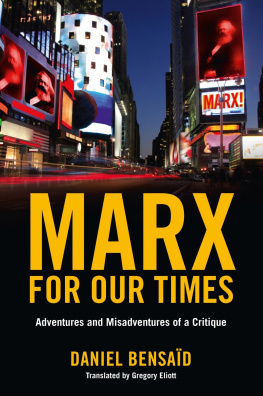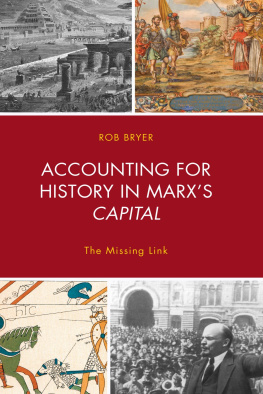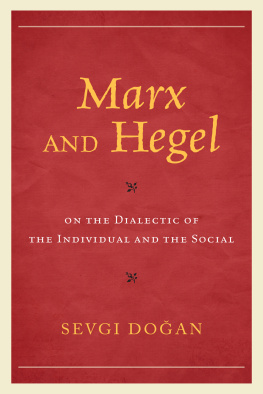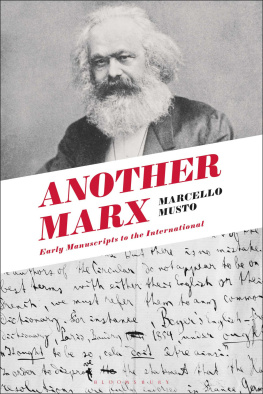Marx for Our Times

Marx for Our Times
Adventures and Misadventures
of a Critique

DANIEL BENSAD
Translated by Gregory Elliott

This book is supported by the French Ministry for Foreign Affairs as part of the
Burgess Programme, headed for the French Embassy in London by the Institut
Franais du Royaume Uni.

This edition first published by Verso 2002
Verso 2002
This paperback edition first published by Verso 2009
Verso 2009
Translation Gregory Elliott 2002
First published as Marx lintempestif
Libraire Arthme Fayard 1995
All rights reserved
The moral rights of the author have been asserted
Verso
UK: 6 Meard Street, London W1F 0EG
USA: 20 Jay Street, Suite 1010, Brooklyn, NY 11201
www.versobooks.com
Verso is the imprint of New Left Books
ISBN 978-1-84467-378-0
British Library Cataloguing in Publication Data
A catalogue record for this book is available from the British Library
Library of Congress Cataloging-in-Publication Data
A catalog record for this book is available from the Library of Congress
Typset in 10/12pt Baskerville by
SetSystems Ltd, Saffron Walden, Essex
For Hippolyte
Contents
Preface to the English Edition
The Archipelago of
a Thousand Marxisms
This book is the result of work undertaken during the 1980s. The French version appeared in October 1995, the same year as its companion text, La Discordance des temps. Back in those times of counter-reformation and neo-liberal reaction, Marx had become a dead dog. Such Marxism as survived was under attack on all sides. In itself, a critical rereading of Marx represented a gesture of resistance, a refusal to submit to adverse currents, a decision to think against the grain, in the conviction that a founding critique like that contained in Capital could not be obsolete. For its actuality is that of its object, its intimate and implacable enemy: capital itself an insatiable vampire and fetish-automaton now more invasive than ever.
In his Recollections of the June Days of 1848, de Tocqueville recalls the fear of a fellow deputy who, as the gunfire was ringing out, came upon two young servants musing about putting an end to the power of their masters. He was, recounts the author of The Ancien Rgime and the Revolution, very careful not to show that he had heard the monkeys, who made him very frightened. And so this good bourgeois prudently waited until the day after the insurrection had been defeated, before dismissing the insolent brats and sending them back to their hovels. In the same passage, Tocqueville evokes his meeting on the rue Saint-Honor with a crowd of workers anxiously listening to the gunfire:
They wore blouses, which, as we all know, are their fighting as well as their working clothes; they were not actually carrying arms, but one could see from the look of them that they were pretty near to taking them up. With hardly restrained delight they noted that the sound of the firing seemed to be getting closer, which meant that the rebels were gaining ground. I had guessed before this that the whole of the working class backed the revolt, either actively or in
Reading this evocation of bourgeois grande peur before the spirit of insurrection, one imagines the slight smile on the lips of the spectre haunting Europe in the spring of 1848: the spectre of communism. A century and a half after the opening declaration of the Communist Manifesto, the spectre seemed to have vanished beneath the rubble of really non-existing socialism. The hour of Counter-Reformations and Restorations had struck. Francis Fukuyama decreed the end of history. In The Passing of an Illusion, Franois Furet claimed to close the file on communism: the issue was settled. Immobilized in its market eternity, capitalism had become the untranscendable horizon of all time. Death of Marx and the avant-gardes? End of history, end of communism?
Ends never finish ending. History strikes back. After Seattle, Genoa and Porto Alegre, it has got its colour back. Ghosts are stirring. Revenants are arriving to disturb the peace of the established order. Close on twenty-five years ago, Newsweek solemnly proclaimed the death of Marx on its front cover. By 1993, the labour of mourning was over. There would, Jacques Derrida wrote in his Specters of Marx, be no future without the memory and the inheritance of Marx: in any case of a certain Marx [and] at least one of his spirits. For, he added, there is more than one of them, there must be more than one. The same year, Gilles Deleuze told a journalist from Le Nouvel Observateur that he did not understand what it meant when people claimed that Marx was wrong, and still less when they claimed that Marx was dead: the urgent task of analyzing the world market and its transformations could not dispense with Marx. My next book and it will be my last, confided Deleuze, will be called Grandeur de Marx. Unfortunately, he did not live to complete the project.
Today, Marx is the subject of colloquia and seminars; he is even included in the prestigious La Pliade collection published by Gallimard. He has been immortalized in academia and publishing; his future seems assured. Communism is a different matter. The word seems forever associated with the bureaucratic crimes committed in its name, as if Christianity was exclusively identified with the Inquisition, dragonnades and forcible conversions.
After the Congress of Vienna in 1815, in an age of Restoration when the names of Robespierre and Saint-Just had become unpronounceable, and the workshops of Silesian and Lyonnais weavers simmered with anger, communism was initially a conspiratorial term, whispered like some good news, the secret name (in Heines words) counterposing proletarian rule to the bourgeois regime. It made its first appearance as part of a resumption of the subterranean advance towards equality. In 1840, the first communist banquet in Belleville added a new word communism to the republican motto of liberty, equality and solidarity. More than a doctrine, communism is, in the first instance, this real movement, this accumulation of constantly renewed experience, this upsurge of hope that puts suppression of the existing order on the agenda. How could a secret name, which rallies resistance, dissidence and rebelliousness from one person to the next, from strikes to riots, be over and done with?
In retrospect, it is easy to pick out the threads of the event and to discover what was being woven silently and obscurely. Since the early 1990s, released from his isms by the fall of the Berlin Wall and the break-up of the Soviet Union, Marx has been out of quarantine. We no longer have the excuse of his capture by the bureaucracy and confiscation by the state to duck the responsibility of rereading and interpreting him. The debate might have remained academic had it not begun to resonate with a revival of struggle. In France, we had the red anger of December 1995, a great surge of winter resistance, the frail rebirth of a left of the left.
But what can resistance achieve when the horizon of expectations has collapsed? After the disasters that had piled up in the twentieth century, amid the troubling silence of better futures that had ceased to resonate, it was very tempting to revert back from scientific socialism to utopian socialism; to escape the dogmatic illusions of the former only to succumb to the senile, exhausted chimeras of the second, without even the excuse of the innocence or enthusiasm of their original

















